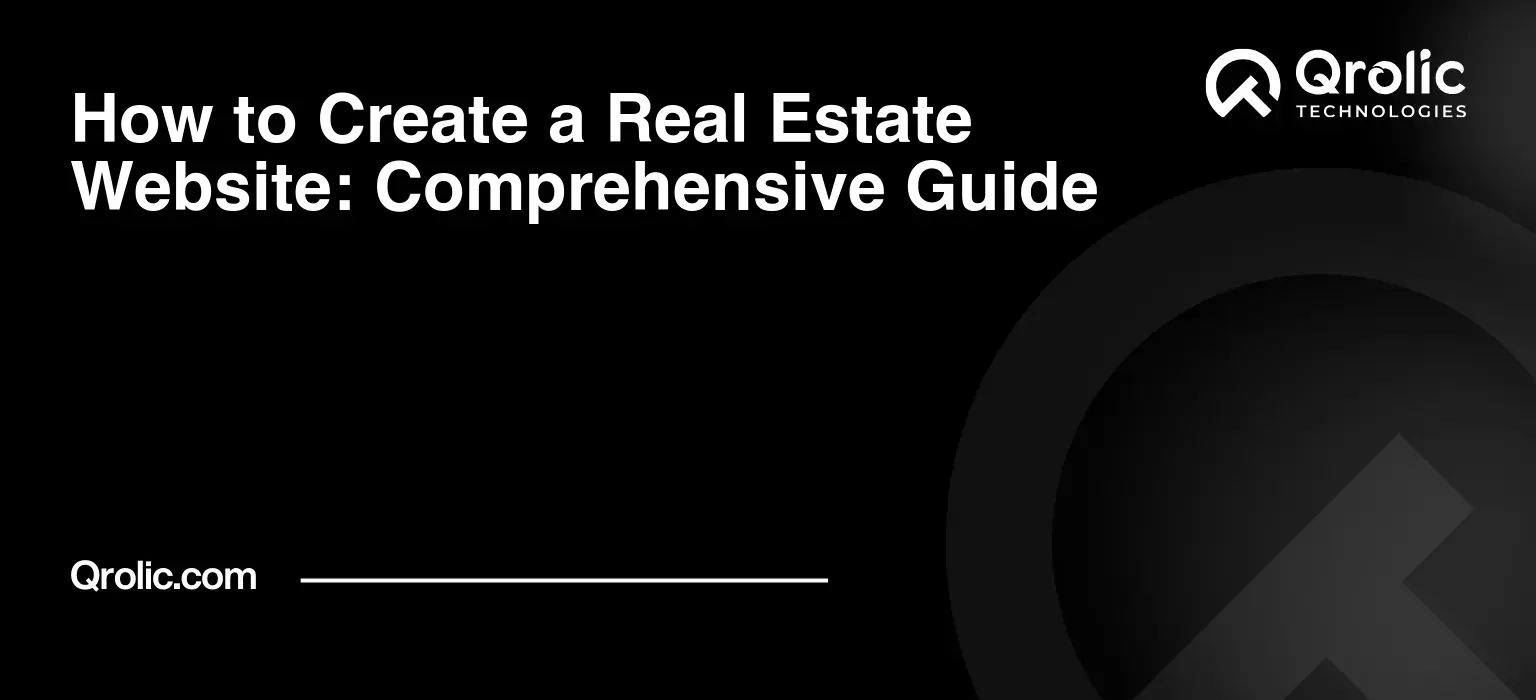Quick Summary:
- Digital presence builds brand and generates leads.
- Include stunning visuals and detailed property listings.
- Optimize for mobile, security, and clear calls-to-action.
- A well-designed website is a vital business investment.
Table of Contents
- Why a Powerful Online Presence is Non-Negotiable for Real Estate Developers
- The Shifting Landscape of Real Estate Marketing: From Print to Pixels
- Benefits of a High-Performing Real Estate Developer Website
- The Cost of Neglecting Your Online Presence
- Key Features of a Successful Real Estate Developer Website
- 1. Stunning Visuals: High-Quality Photography and Videography
- 2. Detailed Property Listings: Comprehensive Information and Engaging Descriptions
- 3. User-Friendly Navigation: Intuitive Design and Seamless Experience
- 4. Compelling Content: Informative and Engaging Articles, Blogs, and Resources
- 5. Lead Capture Forms: Strategically Placed and Easy to Use
- 6. Interactive Maps and Location Information: Showcasing Proximity to Amenities
- 7. Mobile Responsiveness: Ensuring Accessibility on All Devices
- 8. SEO Optimization: Enhancing Visibility in Search Engine Results
- 9. Security Measures: Protecting Sensitive Data and Building Trust
- 10. Call-to-Actions: Guiding Users Towards Conversion
- The Importance of Property Web Design for Real Estate Developers
- Creating a Visually Appealing and Brand-Consistent Design
- Optimizing for User Experience (UX)
- Focusing on Conversion-Driven Design Elements
- Builder Website Design: Showcasing Expertise and Building Trust
- Highlighting Construction Expertise and Capabilities
- Demonstrating Quality and Craftsmanship
- Building Trust and Credibility
- Steps to Website Development for Real Estate Developers
- 1. Planning and Strategy: Defining Goals and Target Audience
- 2. Design and Development: Choosing the Right Platform and Design
- 3. Content Creation: Writing Engaging and Informative Copy
- 4. Testing and Optimization: Ensuring Functionality and Performance
- 5. Launch and Promotion: Getting Your Website Seen
- Qrolic Technologies: Your Partner in Real Estate Website Development
- Why Choose Qrolic Technologies?
- Our Services for Real Estate Developers
- Final Thoughts: Investing in Your Online Future
Why a Powerful Online Presence is Non-Negotiable for Real Estate Developers

In today’s digital age, a robust online presence is not merely an advantage for real estate developers; it’s an absolute necessity. Potential buyers are online. Investors are online. Partners are online. Your website is often the first interaction they have with your brand, and it shapes their initial impression – an impression that can make or break a deal.
The Shifting Landscape of Real Estate Marketing: From Print to Pixels
Remember the days of glossy brochures and newspaper ads? While those mediums still hold a place, the power has shifted. Consumers now conduct extensive research online before even considering contacting a developer. They expect to find information readily available, visually appealing, and easily digestible. A website that fails to meet these expectations is essentially turning away potential business.
Benefits of a High-Performing Real Estate Developer Website
Investing in a well-designed and functional website yields a multitude of benefits, including:
- Lead Generation: Capture qualified leads through contact forms, newsletter sign-ups, and interactive tools.
- Brand Building: Establish your credibility, expertise, and unique selling proposition.
- Project Showcasing: Highlight your past, present, and future developments with stunning visuals and detailed information.
- Investor Attraction: Attract potential investors by showcasing your financial performance, market analysis, and strategic vision.
- Enhanced Customer Experience: Provide a seamless and user-friendly experience that keeps visitors engaged and informed.
- 24/7 Availability: Your website acts as a constant source of information, available to prospects at any time, regardless of time zones.
- Cost-Effectiveness: Compared to traditional marketing methods, a website offers a more cost-effective way to reach a broader audience.
- Data-Driven Insights: Track website traffic, user behavior, and conversion rates to optimize your marketing efforts.
The Cost of Neglecting Your Online Presence
Ignoring the importance of a strong website can have dire consequences:
- Lost Leads: Missing out on potential buyers who are actively searching for properties online.
- Damaged Reputation: A poorly designed or outdated website can damage your credibility and make you appear unprofessional.
- Competitive Disadvantage: Losing ground to competitors who have invested in a superior online presence.
- Reduced Investor Interest: Failing to attract investors who rely on online research to make investment decisions.
Key Features of a Successful Real Estate Developer Website

Creating a high-performing real estate developer website requires careful planning and attention to detail. Here’s a breakdown of the essential features:
1. Stunning Visuals: High-Quality Photography and Videography
-
Why it Matters: Real estate is a visual industry. High-quality images and videos are crucial for showcasing your properties and capturing the attention of potential buyers.
-
Examples:
- Professional Photography: Invest in professional photos of your developments, capturing both interior and exterior shots in optimal lighting conditions.
- Drone Footage: Utilize drone footage to provide stunning aerial views of your projects and their surrounding areas.
- Virtual Tours: Offer immersive virtual tours that allow visitors to explore properties from the comfort of their own homes.
- 3D Renderings: Use 3D renderings to showcase pre-construction developments and give potential buyers a realistic glimpse of what they can expect.
-
Actionable Tip: Always optimize your images and videos for web use to ensure fast loading times.
2. Detailed Property Listings: Comprehensive Information and Engaging Descriptions
-
Why it Matters: Provide potential buyers with all the information they need to make informed decisions. Detailed property listings are essential for converting website visitors into leads.
-
Elements of a Compelling Listing:
- Property Name and Address: Clearly identify the property and its location.
- Price and Availability: Display the price and availability status prominently.
- Key Features and Amenities: Highlight the key features and amenities of the property, such as square footage, number of bedrooms and bathrooms, and unique selling points.
- Floor Plans: Include detailed floor plans to give potential buyers a clear understanding of the property’s layout.
- High-Quality Photos and Videos: Showcase the property with stunning visuals.
- Interactive Maps: Integrate interactive maps to show the property’s location and proximity to local amenities.
- Contact Information: Provide clear and easy-to-find contact information for inquiries.
-
Actionable Tip: Write engaging descriptions that highlight the benefits of owning or renting the property, rather than just listing its features.
3. User-Friendly Navigation: Intuitive Design and Seamless Experience
-
Why it Matters: A website that is difficult to navigate will frustrate visitors and drive them away. User-friendly navigation is crucial for keeping users engaged and encouraging them to explore your website.
-
Key Navigation Principles:
- Clear and Concise Menu: Use a clear and concise menu that is easy to understand.
- Logical Information Architecture: Organize your content in a logical and intuitive manner.
- Search Functionality: Provide a robust search function that allows users to quickly find what they are looking for.
- Mobile Responsiveness: Ensure that your website is fully responsive and accessible on all devices.
- Fast Loading Times: Optimize your website for fast loading times to prevent users from getting frustrated.
-
Actionable Tip: Conduct user testing to identify areas where your website’s navigation can be improved.
4. Compelling Content: Informative and Engaging Articles, Blogs, and Resources
-
Why it Matters: Compelling content is essential for attracting and engaging visitors. It also helps to establish your expertise and build trust with potential buyers.
-
Types of Content to Consider:
- Blog Posts: Write informative and engaging blog posts on topics related to real estate development, such as market trends, investment strategies, and design tips.
- Case Studies: Showcase your past projects with detailed case studies that highlight your expertise and successes.
- White Papers and Ebooks: Offer valuable resources, such as white papers and ebooks, that provide in-depth information on specific topics.
- News and Press Releases: Share company news and press releases to keep visitors informed about your latest developments.
- Testimonials: Include testimonials from satisfied clients to build trust and credibility.
-
Actionable Tip: Create a content calendar to plan and schedule your content creation efforts.
5. Lead Capture Forms: Strategically Placed and Easy to Use
-
Why it Matters: Lead capture forms are essential for generating leads and building your database. They should be strategically placed throughout your website and easy to use.
-
Best Practices for Lead Capture Forms:
- Keep it Simple: Only ask for the information you need.
- Offer Value: Provide something of value in exchange for contact information, such as a free ebook or a consultation.
- Clear Call to Action: Use a clear and compelling call to action.
- Mobile Optimization: Ensure that your forms are optimized for mobile devices.
- Privacy Policy: Include a link to your privacy policy to assure users that their information will be protected.
-
Actionable Tip: Test different form designs and placement to optimize your lead capture rates.
6. Interactive Maps and Location Information: Showcasing Proximity to Amenities
-
Why it Matters: Potential buyers want to know about the location of your properties and their proximity to local amenities. Interactive maps and detailed location information can help them visualize the neighborhood and make informed decisions.
-
Elements to Include:
- Interactive Maps: Integrate interactive maps that allow users to explore the surrounding area.
- Points of Interest: Highlight nearby points of interest, such as schools, hospitals, parks, and shopping centers.
- Transportation Options: Provide information about transportation options, such as public transportation and major roadways.
- Neighborhood Information: Share information about the neighborhood’s demographics, schools, and crime rates.
-
Actionable Tip: Use high-quality photos and videos to showcase the neighborhood and its amenities.
7. Mobile Responsiveness: Ensuring Accessibility on All Devices
-
Why it Matters: More than half of all website traffic now comes from mobile devices. A website that is not mobile-responsive will provide a poor user experience and drive away potential buyers.
-
Key Principles of Mobile Responsiveness:
- Fluid Grids: Use fluid grids that adjust to different screen sizes.
- Flexible Images: Optimize images for mobile devices to ensure fast loading times.
- Touch-Friendly Navigation: Design your navigation for touch-based devices.
- Testing: Thoroughly test your website on different mobile devices to ensure that it is working properly.
-
Actionable Tip: Use Google’s Mobile-Friendly Test tool to check the mobile-friendliness of your website.
8. SEO Optimization: Enhancing Visibility in Search Engine Results
-
Why it Matters: SEO optimization is crucial for attracting organic traffic to your website. By optimizing your website for search engines, you can increase its visibility in search results and attract more potential buyers.
-
Key SEO Strategies:
- Keyword Research: Identify the keywords that potential buyers are using to search for properties online.
- On-Page Optimization: Optimize your website’s content, title tags, and meta descriptions with relevant keywords.
- Link Building: Build high-quality backlinks from other reputable websites.
- Content Marketing: Create informative and engaging content that attracts links and shares.
- Technical SEO: Optimize your website’s technical aspects, such as its site speed and mobile-friendliness.
-
Actionable Tip: Use Google Analytics to track your website’s traffic and SEO performance. Target Keywords: real estate developer website development, property web design, builder website design
9. Security Measures: Protecting Sensitive Data and Building Trust
-
Why it Matters: Security is paramount. Protecting sensitive data and building trust with potential buyers is essential for maintaining a positive reputation.
-
Essential Security Measures:
- SSL Certificate: Install an SSL certificate to encrypt data transmitted between your website and visitors.
- Strong Passwords: Use strong passwords for all of your website accounts.
- Regular Backups: Regularly back up your website data to prevent data loss.
- Security Plugins: Use security plugins to protect your website from malware and hacking attempts.
- Website Firewall: Implement a website firewall to block malicious traffic.
-
Actionable Tip: Regularly update your website’s software and plugins to patch security vulnerabilities.
10. Call-to-Actions: Guiding Users Towards Conversion
-
Why it Matters: Clear and compelling calls-to-action (CTAs) guide users towards desired actions, such as contacting you, downloading a brochure, or scheduling a viewing. They are essential for converting website visitors into leads.
-
Effective CTA Strategies:
- Use Action-Oriented Language: Start your CTAs with action verbs like “Contact,” “Download,” “Schedule,” or “Learn More.”
- Make Them Prominent: Ensure your CTAs are visually prominent using contrasting colors, strategic placement, and sufficient size.
- Provide Clear Value: Clearly communicate the benefit of clicking the CTA. What will the user gain?
- Keep it Concise: CTAs should be short, punchy, and easy to understand at a glance.
- Mobile-Friendly CTAs: Ensure your CTAs are easily clickable on mobile devices.
-
Examples:
- “Contact Us for a Free Consultation”
- “Download Our Brochure”
- “Schedule a Viewing Today”
- “Learn More About This Development”
- “Explore Available Properties”
-
Actionable Tip: A/B test different CTA wording, colors, and placement to optimize conversion rates.
The Importance of Property Web Design for Real Estate Developers

Your website’s design is more than just aesthetics; it’s a crucial element in shaping your brand identity, attracting potential clients, and driving conversions. Property web design tailored specifically for real estate developers requires a unique approach that balances visual appeal with functionality and user experience.
Creating a Visually Appealing and Brand-Consistent Design
-
Brand Identity: Your website’s design should be consistent with your overall brand identity, including your logo, colors, typography, and messaging. This consistency helps to reinforce your brand and build recognition.
-
Modern and Professional Aesthetics: Invest in a modern and professional design that reflects the quality and sophistication of your developments. Avoid outdated designs that can damage your credibility.
-
High-Quality Imagery: Use high-quality photos and videos to showcase your properties and their features. Visual appeal is crucial for capturing the attention of potential buyers.
-
White Space and Readability: Utilize white space effectively to create a clean and uncluttered design that is easy to read and navigate.
Optimizing for User Experience (UX)
-
Intuitive Navigation: Ensure that your website has intuitive navigation that allows users to easily find the information they are looking for.
-
Fast Loading Times: Optimize your website for fast loading times to prevent users from getting frustrated and leaving your site.
-
Mobile Responsiveness: Ensure that your website is fully responsive and accessible on all devices, including smartphones and tablets.
-
Accessibility: Design your website to be accessible to users with disabilities, following accessibility guidelines such as WCAG.
Focusing on Conversion-Driven Design Elements
-
Strategic Placement of CTAs: Place clear and compelling CTAs throughout your website to guide users towards desired actions, such as contacting you or scheduling a viewing.
-
Lead Capture Forms: Integrate lead capture forms into strategic locations on your website to generate leads and build your database.
-
Testimonials and Social Proof: Include testimonials from satisfied clients to build trust and credibility.
-
Analytics Tracking: Implement analytics tracking to monitor your website’s performance and identify areas for improvement.
Builder Website Design: Showcasing Expertise and Building Trust

For real estate developers who also act as builders, your website needs to showcase not only your properties but also your construction expertise and capabilities. This requires a tailored approach to builder website design that emphasizes quality, craftsmanship, and reliability.
Highlighting Construction Expertise and Capabilities
-
Project Portfolios: Showcase your past projects with detailed portfolios that highlight your construction expertise and attention to detail.
-
Case Studies: Share case studies that demonstrate your problem-solving skills and ability to deliver successful projects on time and within budget.
-
Team Profiles: Introduce your team and highlight their experience and qualifications.
-
Certifications and Awards: Display any relevant certifications or awards that demonstrate your commitment to quality and professionalism.
Demonstrating Quality and Craftsmanship
-
High-Quality Photography: Use high-quality photos and videos to showcase the quality of your workmanship and the attention to detail that goes into your projects.
-
Virtual Tours: Offer virtual tours that allow potential clients to explore your completed projects from the comfort of their own homes.
-
Material Specifications: Provide detailed information about the materials used in your projects, highlighting their quality and durability.
-
Sustainability Initiatives: Showcase your commitment to sustainability and environmentally friendly building practices.
Building Trust and Credibility
-
Client Testimonials: Include testimonials from satisfied clients to build trust and credibility.
-
Guarantees and Warranties: Offer guarantees and warranties to assure clients of the quality of your workmanship.
-
Community Involvement: Highlight your involvement in the local community to demonstrate your commitment to the area.
-
Transparency: Be transparent about your pricing and processes to build trust with potential clients.
Steps to Website Development for Real Estate Developers

Building a successful website requires a structured approach. Here’s a step-by-step guide:
1. Planning and Strategy: Defining Goals and Target Audience
- Define Your Goals: What do you want to achieve with your website? (e.g., lead generation, brand awareness, investor attraction).
- Identify Your Target Audience: Who are you trying to reach? (e.g., first-time homebuyers, luxury buyers, investors).
- Conduct Competitive Analysis: Research your competitors’ websites to identify best practices and areas for improvement.
- Develop a Content Strategy: Plan the content you will include on your website, such as property listings, blog posts, and case studies.
- Create a Site Map: Outline the structure and organization of your website.
2. Design and Development: Choosing the Right Platform and Design
- Choose a Platform: Select a suitable platform for your website, such as WordPress, Wix, or Squarespace.
- Select a Theme or Template: Choose a theme or template that is visually appealing, mobile-responsive, and SEO-friendly.
- Customize the Design: Customize the design to match your brand identity and create a unique look and feel.
- Develop the Website: Build the website according to your design and content strategy.
- Integrate Essential Features: Integrate essential features, such as property listings, lead capture forms, and interactive maps.
3. Content Creation: Writing Engaging and Informative Copy
- Write Compelling Copy: Write engaging and informative copy that highlights the benefits of your properties and services.
- Optimize for SEO: Optimize your content with relevant keywords to improve your website’s visibility in search engine results.
- Use High-Quality Images and Videos: Use high-quality images and videos to showcase your properties and their features.
- Proofread and Edit: Proofread and edit your content carefully to ensure that it is error-free.
4. Testing and Optimization: Ensuring Functionality and Performance
- Test Functionality: Test all of your website’s features to ensure that they are working properly.
- Check Mobile Responsiveness: Check that your website is fully responsive and accessible on all devices.
- Optimize Site Speed: Optimize your website for fast loading times.
- Conduct User Testing: Conduct user testing to identify areas for improvement.
5. Launch and Promotion: Getting Your Website Seen
- Launch Your Website: Launch your website and make it accessible to the public.
- Promote Your Website: Promote your website through social media, email marketing, and other channels.
- Monitor Performance: Monitor your website’s performance using Google Analytics and other tools.
- Make Updates and Improvements: Regularly update your website with fresh content and make improvements based on your performance data.
Qrolic Technologies: Your Partner in Real Estate Website Development

At Qrolic Technologies (https://qrolic.com/), we understand the unique needs of real estate developers when it comes to website development. We offer comprehensive web design and development services tailored specifically for the real estate industry.
Why Choose Qrolic Technologies?
- Industry Expertise: We have extensive experience working with real estate developers and understand the nuances of the industry.
- Custom Solutions: We create custom website solutions that are tailored to your specific goals and requirements.
- Modern Design: We design visually appealing and modern websites that reflect the quality of your developments.
- User-Friendly Experience: We focus on creating user-friendly websites that are easy to navigate and provide a seamless experience.
- SEO Optimization: We optimize your website for search engines to improve its visibility and attract more potential buyers.
- Mobile Responsiveness: We ensure that your website is fully responsive and accessible on all devices.
- Ongoing Support: We provide ongoing support and maintenance to ensure that your website is always up-to-date and performing optimally.
Our Services for Real Estate Developers
- Website Design and Development: We create custom websites that are tailored to your specific needs and goals.
- Property Web Design: We specialize in designing websites that showcase your properties in the best possible light.
- Builder Website Design: We design websites that highlight your construction expertise and build trust with potential clients.
- SEO Optimization: We optimize your website for search engines to improve its visibility and attract more organic traffic.
- Content Marketing: We create engaging and informative content that attracts and engages potential buyers.
- Digital Marketing: We offer a full range of digital marketing services to help you reach your target audience.
Final Thoughts: Investing in Your Online Future

Investing in a well-designed and functional website is one of the most important investments you can make as a real estate developer. Your website is your online storefront, and it plays a crucial role in attracting potential buyers, building your brand, and driving conversions. By following the tips and strategies outlined in this article, you can create a website that sets you apart from the competition and helps you achieve your business goals. Remember to prioritize user experience, high-quality visuals, compelling content, and SEO optimization. With the right approach, your website can become a powerful tool for generating leads, attracting investors, and ultimately, growing your business.








